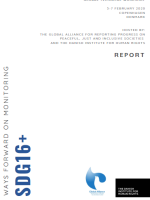
Ways Forward on Monitoring SDG 16+
SDG 16+ is known as the group of 36 SDG targets covering the 2030 Agenda aspects related to peace, justice, and inclusion (read more on this concept here).
To date, only a few countries and statistical offices have experience in producing governance data or in establishing the type of inclusive data ecosystems needed to monitor and report on SDG 16+. There is also a vast missed opportunity to use data and information produced for other relevant reporting processes, including for human rights mechanisms, to report on issues related to peace, justice, and inclusion. While the 2019 VNRs generally provided more data analysis and included a more comprehensive list of data sources than the ones in previous years, a lack of data – especially pertaining to SDG 16+ – remained a challenge for States.
In response to these challenges, the Global Alliance for Reporting Progress on Peaceful, Just and Inclusive Societies and the Danish Institute for Human Rights convened a global technical workshop entitled ‘Ways Forward on Monitoring SDG 16+’.
This workshop report addresses the evident need to identify, highlight and share specific progress on monitoring stakeholder engagement and partnerships, as well as details on challenges, shortfalls, needs and plans of action to implement and monitor SDG 16+ targets. It also presents ways forward to strengthen the links between the SDG and the human rights communities to accelerate action towards the 2030 Agenda to ensure no one is left behind.
Topics covered in this report include:
- Monitoring thematic issues related to SDG 16 such as corruption, violence, access to information and fundamental freedoms;
- cross-cutting SDG 16+ monitoring issues such as the nationalization of indicators;
- alignment of human rights and SDG implementation, monitoring and reporting;
- data collection and disaggregation;
- alternative data sources;
- stakeholder engagement; and
- institutionalization of monitoring mechanisms.
We strive to make the pdf versions of our publications etc. accessible for screen readers. If you experience any problems, please contact Digital Editor Stine Juhl Nielsen on stni@humanrights.dk
